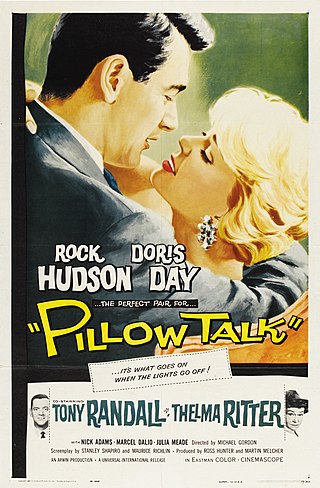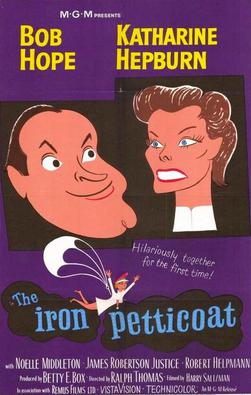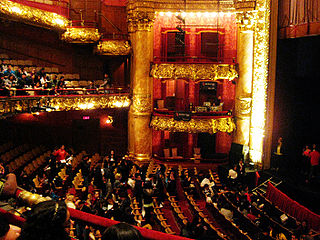Related Research Articles

Doris Day was an American actress and singer. She began her career as a big band singer in 1937, achieving commercial success in 1945 with two No. 1 recordings, "Sentimental Journey" and "My Dreams Are Getting Better All the Time" with Les Brown and His Band of Renown. She left Brown to embark on a solo career and recorded more than 650 songs from 1947 to 1967.
The year 1959 in film involved some significant events, with Ben-Hur winning a record 11 Academy Awards.

Pillow Talk is a 1959 American romantic comedy film in CinemaScope directed by Michael Gordon and starring Rock Hudson and Doris Day. The supporting cast features Tony Randall, Thelma Ritter, Nick Adams, Allen Jenkins, Marcel Dalio and Lee Patrick. The film was written by Russell Rouse, Maurice Richlin, Stanley Shapiro, and Clarence Greene.

Porgy and Bess is an English-language opera by American composer George Gershwin, with a libretto written by author DuBose Heyward and lyricist Ira Gershwin. It was adapted from Dorothy Heyward and DuBose Heyward's play Porgy, itself an adaptation of DuBose Heyward's 1925 novel Porgy.
The 2nd Annual Grammy Awards were held on November 29, 1959, at Los Angeles and New York. They recognized musical accomplishments by performers for the year 1959. Hosted by Meredith Willson, this marked the first televised Grammy Award ceremony, and it was aired in episodes as special Sunday Showcase. It was held in the same year as the first Grammy Awards in 1959, and no award ceremony was held in 1960. These awards recognized musical accomplishments by performers for that particular year. Frank Sinatra and Duke Ellington each won three awards.

The Diary of Anne Frank is a 1959 American biographical drama film based on the Pulitzer Prize-winning 1955 play of the same name, which was in turn based on the posthumously published diary of Anne Frank, a German-born Jewish girl who lived in hiding in Amsterdam with her family during World War II. It was directed by George Stevens, a Hollywood filmmaker previously involved with capturing evidence of concentration camps during the war, with a screenplay by Frances Goodrich and Albert Hackett. It is the first film version of both the play and the original story, and features three members of the original Broadway cast.

Ben Hur is a 1907 American silent drama film set in ancient Rome, the first screen adaptation of Lew Wallace's popular 1880 novel Ben-Hur: A Tale of the Christ. Co-directed by Sidney Olcott and Frank Oakes Rose, this "photoplay" was produced by the Kalem Company of New York City, and its scenes, including the climactic chariot race, were filmed in the city's borough of Brooklyn.

The Iron Petticoat is a 1956 British Cold War comedy film starring Bob Hope and Katharine Hepburn, and directed by Ralph Thomas. The screenplay by Ben Hecht became the focus of a contentious history behind the production, and led to the film's eventual suppression by Hope. Hecht had been part of the screenwriting team on the similarly themed Comrade X (1940).

The Colonial Theatre in Boston, Massachusetts, opened in 1900, is the oldest continually-operating theatre in the city. It is located at 106 Boylston Street on Boston Common at the former site of the Boston Public Library. It is a pending Boston Landmark.

Porgy and Bess is a 1959 American musical drama film directed by Otto Preminger, and starring Sidney Poitier and Dorothy Dandridge in the titular roles. It is based on the 1935 opera Porgy and Bess by George Gershwin, DuBose Heyward and Ira Gershwin, in turn based on Heyward's 1925 novel Porgy, as well as Heyward's subsequent 1927 non-musical stage adaptation, co-written with his wife Dorothy. The film's screenplay, which turned the operatic recitatives into spoken dialogue, was very closely based on the opera and was written by N. Richard Nash. In 2011, the film was chosen for inclusion in the National Film Registry of the Library of Congress.

Ross Hunter was an American film and television producer and actor. He is best known for producing light comedies such as Pillow Talk (1959), and the glamorous melodramas Magnificent Obsession (1954), Imitation of Life (1959), and Back Street (1961).
The 32nd Academy Awards ceremony was held on April 4, 1960, at the RKO Pantages Theatre, to honor the films of 1959.

Lover Come Back is a 1961 American Eastmancolor romantic comedy film released by Universal Pictures and directed by Delbert Mann. It stars Doris Day and Rock Hudson and is their second time working together. The supporting cast includes Tony Randall, Edie Adams, Ann B. Davis, and Donna Douglas.

The Nun's Story is a 1959 American drama film directed by Fred Zinnemann and starring Audrey Hepburn, Peter Finch, Edith Evans, Peggy Ashcroft, and Dean Jagger. The screenplay was written by Robert Anderson, based on the 1956 novel of the same name by Kathryn Hulme. The film tells the life of Gabrielle Van Der Mal (Hepburn), a young woman who decides to enter a convent and make the many sacrifices required by her choice.
The following is a list of the Top 10 Films chosen annually by the National Board of Review of Motion Pictures, beginning in 1929.
The 25th New York Film Critics Circle Awards, honored the best filmmaking of 1959.
The 31st National Board of Review Awards were announced in late December, 1959.

Stanley Shapiro was an American screenwriter and producer responsible for three of Doris Day's most successful films.
The 13th British Academy Film Awards, given by the British Academy of Film and Television Arts in 1960, honoured the best films of 1959.

The National Film Registry (NFR) is the United States National Film Preservation Board's (NFPB) collection of films selected for preservation, each selected for its historical, cultural and aesthetic contributions since the NFPB's inception in 1988.